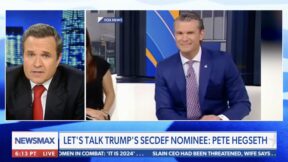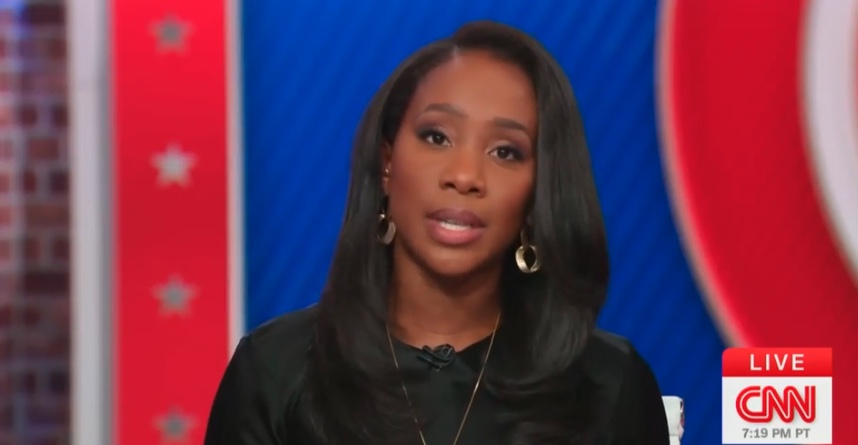CNN Invited the Shameful Ryan Girdusky Moment By Creating a Panel Show Around Pointless, Petty and Personal Conflict
Viewers of CNN’s NewsNight were likely caught off guard by Abby Phillip telling them that one of her guests, Ryan Gidursky, had been removed from the show’s panel after he insinuated fellow panelist Mehdi Hasan was, at best, a Hezbollah sympathizer and at worst, an actual terrorist.
It was the culmination of an ugly episode handled gracefully by the anchor and by the network itself — which quickly issued a statement condemning Gidursky’s comments and announcing he would not be invited back on CNN. Philip’s words to camera are worth including here because they get to the essence of her show’s standards:
There is a line that was crossed there, and it’s not acceptable to me. It’s not acceptable to us at this network. We want discussion. We want people who disagree with each other to talk to each other. But when you cross the line of a complete lack of civility, that is not going to happen here on this show. It’s a heated time. We’re in the middle of a political season. We are eight days from a presidential election. But we can have conversations about what is happening in this country without resorting to the lowest of the lowest kind of discourse. Want to address that.
And I want to apologize to the viewers at home because we wanna be able to hear each other. We wanna be able to talk to each other. And we plan to do that in this next segment.
But however astute the handling of the ugly ordeal was, it was a bound-to-happen moment for anyone paying attention to how NewsNight has dramatically evolved since it was remade as a classic clash of cable news pundits — each dying to go viral with some sick burn of a partisan rival.
The esteemed media critic Brian Steinberg summed up the show’s quick transition writing for Variety in September, first explaining its origin story:
“NewsNight,” which launched in the aftermath of the terrorist attack on Israel in October of last year, looked at first like most other programs on CNN and its main rivals, Fox News Channel and MSNBC. Phillip sat alone on set, always spoke directly to the audience and interviewed experts, analysts and newsmakers about the most important headlines of the day. Earlier this summer, CNN remade the program — which shares its title with a primetime show anchored by Aaron Brown on the network in the early 2000s — and it has quickly become the loudest thing on the schedule. The program operates at a volume that has almost become unrecognizable in these days of ownership under risk-averse Warner Bros. Discovery.
But Steinberg’s observation is that it has recently become something of an ideological battleground, with DNA much closer to that of the show Jon Stewart once suggested was CNN’s original sin, Crossfire, which regularly featured fights between James Carville, Paul Begala, Tucker Carlson, and Mary Matalin (among other dignitaries).
During a famous appearance in 2004, Stewart told the show’s hosts that their regular partisan bickering was “hurting America,” which resonated so deeply that former CNN CEO Jonathan Klein canceled the show. But Steinberg’s description of the Phillip-anchored NewsNight captures the business motivations behind re-tooling the show:
In recent weeks, however, the network has seemed to be on the verge of rekindling its inner Zucker. CNN re-hired Brian Stelter, who anchored the long-running but now defunct “Reliable Sources” media-criticism program and became a CNN fixture under former president Jeff Zucker, who managed the network with significantly more flair during the Trump administration.
…
Could the strategy be working? Viewership for the retooled “NewsNight” is on the rise. To be sure, the overall audience for the program is small compared to its rivals, part of a broader decline in CNN’s ratings in recent years. The “NewsNight” crowd remains under 1 million on most nights, while both Fox News’ “Gutfeld” and MSNBC’s “The Last Word with Lawrence O’Donnell” handily break that mark. Since launching in late July, however, the new format has sparked an 82% increase among viewers between 25 and 54 — the demographic most coveted by advertisers in news programs — when compared to its performance in June. More noticeable, perhaps: In September through the 11th, “NewsNight” had the second-highest viewership among the 25-to-54 crowd on CNN — only Anderson Cooper’s 8 p.m. hour won more.
There it is — currying cable news fights is good for business, especially after the rollout of the original iteration of NewsNight failed to make any splash, either in ratings or the sort of watercooler moments that are bread and butter for sites like ours.
But there’s a reason we’re not writing this column about CNN This Morning with Kasie Hunt—which has come to regularly feature panel discussions—or CNN’s Inside Politics, Fox’s The Five or Outnumbered, MSNBC’s Morning Joe, or Deadline: White House—although those shows tend to feature a much more narrow point of view with little to no dissent.
The issue with NewsNight is not the spirited conversation — the shows I just mentioned all have that. The difference with NewsNight’s format is that encourages sharp, sassy and personal insults from one panelist to another. The spicier the fight, the more attention the show gets, and as a result, more viewers tune in. Judging by an increase in viewers, it’s working from a business standpoint. But let’s not be surprised when things go so far off the rails that a guest must be removed from the show, and the anchor needs to apologize to their viewers.
The writing was on the wall when Scott Jennings dismissed his fellow Panelists during a particularly piqued argument, saying, “It’s conspiracy theory night on the Abby Phillip show.” Or when Democratic strategist Keith Boykin yelled, “You’re a liar, congressman!” at Rep. Byron Donalds about crime being on the rise under the Biden administration. Or guest Leigh McGowan shouting, “This is insane!” at two of her fellow panelists who attempted to downplay some of former President Donald Trump’s most incendiary remarks.
These are just a handful of examples where Socratic discourse gave way to the lesser angels of NewsNight panelists, which may have been good for clicks but not so great for the health of the body politic. It’s part of a more significant trend at a network struggling with ratings and willing to throw anything at the wall to get people to tune in, when the network boasts some of the absolute best in business at conducting thoughtful and news-eliciting interviews — namely, Anderson Cooper and Jake Tapper, for example.
This ugly episode from Monday night was not a bug; it was very much a feature of what CNN programmers are looking for. If they are not careful, this could damage a brand already dealing with dubious criticism from a presidential candidate who may very well return to the White House.
This is an opinion piece. The views expressed in this article are those of just the author.







